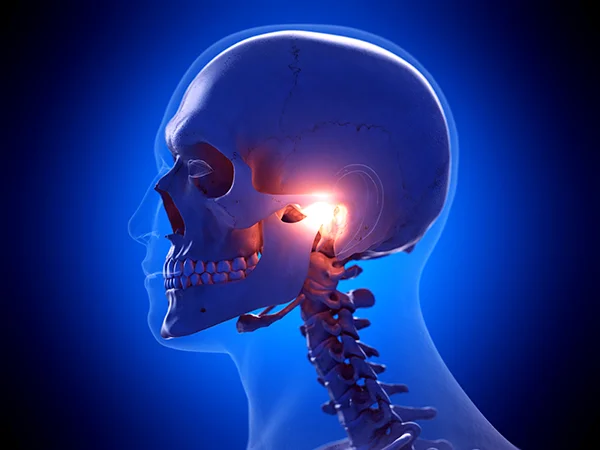TMJ Treatment It can be hard to determine if your mouth and jaw pain is caused by a minor injury or something more serious. How do you know when you should see your dentist? Sometimes temporomandibular joint (TMJ) disorder can be treated with lifestyle changes like avoiding unnecessary jaw movement and eating softer foods. You might also find relief with pain relievers or heating packs to relax the muscles around your jaw joints. But that's not always enough to fix chronic TMJ. You must visit your dentist to determine the real root cause of your TMJ problem. TMJ can have adverse effects on your dental and overall health. This is why we urge you to visit our Kaw Valley Family Dental clinic to learn how to deal with your TMJ or temporomandibular disorder (TMD). It can be hard to determine if your mouth and jaw pain is caused by a minor injury or something more serious. How do you know when you should see your dentist? Sometimes temporomandibular joint (TMJ) disorder can be treated with lifestyle changes like avoiding unnecessary jaw movement and eating softer foods. You might also find relief with pain relievers or heating packs to relax the muscles around your jaw joints. But that's not always enough to fix chronic TMJ. You must visit your dentist to determine the real root cause of your TMJ problem. TMJ can have adverse effects on your dental and overall health. This is why we urge you to visit our Kaw Valley Family Dental clinic to learn how to deal with your TMJ or temporomandibular disorder (TMD).Causes of TMJTemporomandibular joint and muscle disorders, commonly called TMJ, are a group of conditions that cause pain and dysfunction in the jaw joint and muscles that control jaw movement. The exact cause of TMJ is often difficult to determine, but problems with the jaw, jaw joint or TMJ, and surrounding facial muscles that control chewing, talking, and other essential functions can lead to the signs and symptoms of this condition. One common cause of TMJ includes grinding or clenching the teeth, which puts a lot of pressure on the jaw joint. Another is dislocation of the soft cushion or disc between the ball and socket. Also, arthritis, or degeneration of the temporomandibular joint, or stress, can be attributed to be major causes of TMJ as these cause a person to tighten facial and jaw muscles or clench the teeth. Symptoms of TMJThe most common symptom of TMJ is pain in the jaw joint. Many people also have referred pain in their ears, shoulders, even neck. Additionally, you may experience headaches or migraines, ringing in your ears, dizziness and nausea. There may also be a clicking sound in your jaw joint when you open or close your mouth. Your bite may feel off, or it could feel like your teeth don't fit together correctly. Finally, you might notice that your jaw is locking up on you when you try to open your mouth really wide. The symptoms of TMJ can be very debilitating for some people, so it's important to address them immediately. Even if your symptoms are mild at first, without treatment they can become worse over time. The good news is that there are many ways to treat TMJ and relieve its symptoms. How Does TMJ Affect Oral Health?Since teeth grinding is one of the leading causes of TMJ, it can affect your teeth and gums. Often, people grind their teeth while they sleep without knowing it. It's called bruxism and can cause a buildup of bacteria in the mouth that leads to tooth decay and gum disease. If you are experiencing symptoms of bruxism such as sensitive teeth or a sore jaw, your dentist may recommend wearing a mouthguard at night to protect your teeth from grinding against each other. Treatments for TMJIf TMJ is left untreated it can lead to severe pain in the mouth. Therefore, it is wise to visit us at Kaw Valley Family Dental to get the best treatment options available. You can also call us through 913-441-3373 for more information about TMJ. |